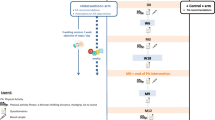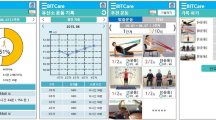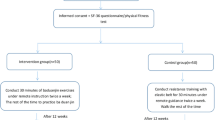Abstract
Purpose
To investigate and compare the effects of mobile health (mHealth) and pedometer with conventional exercise program using a brochure on physical function and quality of life (QOL).
Methods
The study was a prospective, quasi-randomized multicenter trial where 356 patients whose cancer treatment had been terminated were enrolled. All patients were instructed to perform a 12-week regimen of aerobic and resistance exercise. The mHealth group received a pedometer and a newly developed smartphone application to provide information and monitor the prescribed exercises. Those in the conventional group received an exercise brochure. Physical measurements were conducted at baseline, 6 weeks, and 12 weeks. Self-reported physical activity (international physical activity questionnaire-short form), general QOL (European Organization for Research and Treatment of Cancer Quality of Life Questionnaire Core 30), and breast cancer-specific QOL (Quality of Life Questionnaire Breast Cancer Module 23) were assessed at baseline and 12 weeks. A user satisfaction survey was assessed in the mHealth group.
Results
Basic characteristics were not different between the two groups except for age and previous radiotherapy. Physical function, physical activity, and QOL scores were significantly improved regardless of the intervention method, and changes were not significantly different between the two groups. Additionally, the mean Likert scale response for overall satisfaction with the service was 4.27/5 in the mHealth group.
Conclusions
Overall, both the mHealth coupled with pedometer and conventional exercise education using a brochure were effective in improving physical function, physical activity, and QOL. This study provides a basis of mHealth research in breast cancer patients for progressing further developing field, although superiority of the mHealth over the conventional program was not definitely evident.
Access this article
We’re sorry, something doesn't seem to be working properly.
Please try refreshing the page. If that doesn't work, please contact support so we can address the problem.

Similar content being viewed by others
References
World Health Organization’s International Agency for Research on Cancer (2014) World cancer report 2014. http://www.who.int/cancer/detection/breastcancer/en/index1.html. Accessed 5 Sep 2016
Dieli-Conwright CM, Orozco BZ (2015) Exercise after breast cancer treatment: current perspectives. Breast Cancer 7:353–362. doi:10.2147/bctt.s82039
Kim CJ, Kang DH, Park JW (2009) A meta-analysis of aerobic exercise interventions for women with breast cancer. West J Nurs Res 31(4):437–461. doi:10.1177/0193945908328473
Zeng Y, Huang M, Cheng AS, Zhou Y, So WK (2014) Meta-analysis of the effects of exercise intervention on quality of life in breast cancer survivors. Breast Cancer 21(3):262–274. doi:10.1007/s12282-014-0521-7
Holmes MD, Chen WY, Feskanich D, Kroenke CH, Colditz GA (2005) Physical activity and survival after breast cancer diagnosis. JAMA 293(20):2479–2486. doi:10.1001/jama.293.20.2479
Playdon MC, Bracken MB, Sanft TB, Ligibel JA, Harrigan M, Irwin ML (2015) Weight gain after breast cancer diagnosis and all-cause mortality: systematic review and meta-analysis. J Natl Cancer Inst 107(12):djv275. doi:10.1093/jnci/djv275
Schmitz KH, Courneya KS, Matthews C, Demark-Wahnefried W, Galvao DA, Pinto BM, Irwin ML, Wolin KY, Segal RJ, Lucia A, Schneider CM, von Gruenigen VE, Schwartz AL (2010) American College of Sports Medicine roundtable on exercise guidelines for cancer survivors. Med Sci Sports Exerc 42(7):1409–1426. doi:10.1249/MSS.0b013e3181e0c112
Benton MJ, Schlairet MC, Gibson DR (2014) Change in quality of life among breast cancer survivors after resistance training: is there an effect of age? J Aging Phys Act 22(2):178–185. doi:10.1123/japa.2012-0227
Vallance JK, Courneya KS, Plotnikoff RC, Yasui Y, Mackey JR (2007) Randomized controlled trial of the effects of print materials and step pedometers on physical activity and quality of life in breast cancer survivors. J Clin Oncol 25(17):2352–2359. doi:10.1200/jco.2006.07.9988
Vallance JK, Courneya KS, Plotnikoff RC, Dinu I, Mackey JR (2008) Maintenance of physical activity in breast cancer survivors after a randomized trial. Med Sci Sports Exerc 40(1):173–180. doi:10.1249/mss.0b013e3181586b41
Mobasheri MH, Johnston M, King D, Leff D, Thiruchelvam P, Darzi A (2014) Smartphone breast applications—what’s the evidence? Breast 23(5):683–689. doi:10.1016/j.breast.2014.07.006
de Jongh T, Gurol-Urganci I, Vodopivec-Jamsek V, Car J, Atun R (2012) Mobile phone messaging for facilitating self-management of long-term illnesses. Cochrane Database Syst Rev 12:Cd007459. doi:10.1002/14651858.CD007459.pub2
Bravo C, O’Donoghue C, Kaplan CP, Luce J, Ozanne E (2014) Can mHealth improve risk assessment in underserved populations? Acceptability of a breast health questionnaire app in ethnically diverse, older, low-income women. J Health Disparities Res Pract 7(4)
McCarroll ML, Armbruster S, Pohle-Krauza RJ, Lyzen AM, Min S, Nash DW, Roulette GD, Andrews SJ, von Gruenigen VE (2015) Feasibility of a lifestyle intervention for overweight/obese endometrial and breast cancer survivors using an interactive mobile application. Gynecol Oncol 137(3):508–515. doi:10.1016/j.ygyno.2014.12.025
Quintiliani LM, Mann DM, Puputti M, Quinn E, Bowen DJ (2016) Pilot and feasibility test of a mobile health-supported behavioral counseling intervention for weight management among breast cancer survivors. JMIR Cancer 2(1):e4. doi:10.2196/cancer.5305
Istepanian RS, Hu S, Philip NY, Sungoor A (2011) The potential of Internet of m-health Things “m-IoT” for non-invasive glucose level sensing. In: Conference of the annual international conference of the IEEE engineering in medicine and biology society IEEE engineering in medicine and biology society annual conference 2011, pp 5264–5266. doi:10.1109/iembs.2011.6091302
Bohannon RW, Wang YC, Gershon RC (2015) Two-minute walk test performance by adults 18 to 85 years: normative values, reliability, and responsiveness. Arch Phys Med Rehabil 96(3):472–477. doi:10.1016/j.apmr.2014.10.006
Lee D, Hwang JH, Chu I, Chang HJ, Shim YH, Kim JH (2015) Analysis of factors related to arm weakness in patients with breast cancer-related lymphedema. Support Care Cancer 23(8):2297–2304. doi:10.1007/s00520-014-2584-6
Millor N, Lecumberri P, Gomez M, Martinez-Ramirez A, Izquierdo M (2013) An evaluation of the 30-s chair stand test in older adults: frailty detection based on kinematic parameters from a single inertial unit. J Neuroeng Rehabil 10:86. doi:10.1186/1743-0003-10-86
Cho KH, Bok SK, Kim YJ, Hwang SL (2012) Effect of lower limb strength on falls and balance of the elderly. Ann Rehabil Med 36(3):386–393. doi:10.5535/arm.2012.36.3.386
Chun MY (2012) Validity and reliability of korean version of international physical activity questionnaire short form in the elderly. Korean J Fam Med 33(3):144–151. doi:10.4082/kjfm.2012.33.3.144
Patterson E (2010) Guidelines for data processing and analysis of the International Physical Activity Questionnaire (IPAQ)—short and long forms. https://sites.google.com/site/theipaq/scoring-protocol. Accessed 5 Sep 2016
Fayers PMAN, Bjordal K, Groenvold M, Curran D, Bottomley A (2001) The EORTC QLQ-C30 scoring manual, 3rd edn. European Organisation for Research and Treatment of Cancer, Brussels
Keilani M, Hasenoehrl T, Neubauer M, Crevenna R (2016) Resistance exercise and secondary lymphedema in breast cancer survivors—a systematic review. Support Care Cancer 24(4):1907–1916. doi:10.1007/s00520-015-3068-z
Schmitz KH, Ahmed RL, Troxel AB, Cheville A, Lewis-Grant L, Smith R, Bryan CJ, Williams-Smith CT, Chittams J (2010) Weight lifting for women at risk for breast cancer-related lymphedema: a randomized trial. JAMA 304(24):2699–2705. doi:10.1001/jama.2010.1837
van den Berg SW, Gielissen MF, Custers JA, van der Graaf WT, Ottevanger PB, Prins JB (2015) BREATH: web-based self-management for psychological adjustment after primary breast cancer-results of a multicenter randomized controlled trial. J Clin Oncol 33(25):2763–2771. doi:10.1200/jco.2013.54.9386
Fu MR, Axelrod D, Guth A, Scagliola J, Rampertaap K, El-Shammaa N, Fletcher J, Zhang Y, Qiu JM, Schnabel F, Hiotis K, Wang Y, D’Eramo Melkus G (2016) A web- and mobile-based intervention for women treated for breast cancer to manage chronic pain and symptoms related to lymphedema: randomized clinical rrial rationale and protocol. JMIR Res Protoc 5(1):e7. doi:10.2196/resprot.5104
Acknowledgements
This research was supported by the National Information Society Agency (NIA) funded by the Ministry of Science, ICT and Future Planning (Smart After Care Service for Cancer and Cardiac Disease).
Author information
Authors and Affiliations
Corresponding authors
Ethics declarations
Conflict of interests
The authors declare that they have no conflicts of interest.
Informed consent
Informed consent was obtained from all individual participants included in the study.
Electronic supplementary material
Below is the link to the electronic supplementary material.
Rights and permissions
About this article
Cite this article
Uhm, K.E., Yoo, J.S., Chung, S.H. et al. Effects of exercise intervention in breast cancer patients: is mobile health (mHealth) with pedometer more effective than conventional program using brochure?. Breast Cancer Res Treat 161, 443–452 (2017). https://doi.org/10.1007/s10549-016-4065-8
Received:
Accepted:
Published:
Issue Date:
DOI: https://doi.org/10.1007/s10549-016-4065-8




